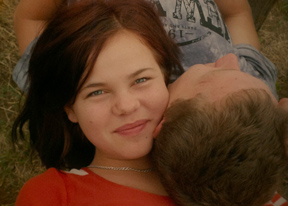Transnistra
 SWEDEN, DENMARK, BELGIUM / 2019 / Russian, Romanian, Ukrainian / Color / DCP / 96 min
SWEDEN, DENMARK, BELGIUM / 2019 / Russian, Romanian, Ukrainian / Color / DCP / 96 min
Director, Editing: Anna Eborn
Photography: Virginie Surdej
Music: Walter Hus
Sound Design: Thomas Jaeger
Producers: David Herdies, Michael Krotkiewski
World Sales: CAT&Docs
On the border between Ukraine and Moldova lies a small country called Transnistria that declared its independence in 1990. Seventeen-year-old Tania spends a summer in riversides, forests and ruined buildings among five boys who fight over her. Brief, radiant moments in which friendship vies dangerously with love are documented by the camera on 16mm film. As the seasons change from summer to fall and finally to winter, the emotional lives of the young people fluctuate back and forth between anxiety about the future and the comfort they find in the natural outdoor environment of their hometown. A migrant worker, a soldier, or an outlaw: these are their only choices. Faced with the harshness of reality, the season of youth—which seemed everlasting—is sipped away by the sky.
[Director’s Statement] My latest movie takes place in Transnistria—also known as Priednestrovia—a young and not yet recognized country situated in the north of Moldova, bordering Ukraine and formed in the early 1990s as a result of the fall of the Soviet Union. I asked myself how the generation born in the nineties might feel about growing up in a Soviet-inspired system that the surrounding countries turned their backs to. Going there, I realized that even if some traditions are as old as the monuments of Lenin, the young people in Transnistria today are much more influenced by modern Russia than the old Soviet state: they listen to modern Russian pop and some are even fans of Putin. And even though some don’t seem to care about the political situation at all, almost everyone I met was proud to be a Transnistrian.
During my first research I met a very special group of friends. The dynamics of the group—five boys and one girl—were extremely fascinating. I wanted them to be the center of the movie. Through them, I wanted to catch the search for first love, with seventeen-year-old Tanya right in the middle of it all. The group spends most of their time outside: by the river trying to learn how to swim or climbing the facades of abandoned buildings, throwing stones through open holes in walls where windows were never installed. They are moving inside unfinished architecture where narrative has been cancelled, interrupted or put on hold. Contradictorily enough, the friends feel safe in these seemingly unsafe places, where one can get seriously hurt quite easily. This lack of structure and the ever-changing mood of one young person’s heart inspired me towards a narrative with a free architecture and order. During summer, the friends hang out without being interrupted by grown-ups and the arrival of their own adulthood is postponed. But the further we go into the movie and as the months pass by, the friends are confronted by society. Each in their own way, they are measured by the adult world to see to what extent they fit the norms of society.
Born in 1983, in Sweden. Her debut feature-length and self-edited documentary, Pine Ridge (2013), was an Official Selection at the Venice International Film Festival 2013, and won best Nordic documentary at the International Film festival in Gothenburg in 2014. Further films include Epifania (2016), a hybrid of fiction and documentary, which premiered at the Busan International Film Festival in 2016 and the feature-length documentary Lida (2017), which premiered in competition at CPH:DOX 2017 and was shown in the international competition at Visions du Réel 2017. Transnistra celebrated its world premiere in the Big Screen Competition at the 2019 International Film Festival Rotterdam (IFFR).
